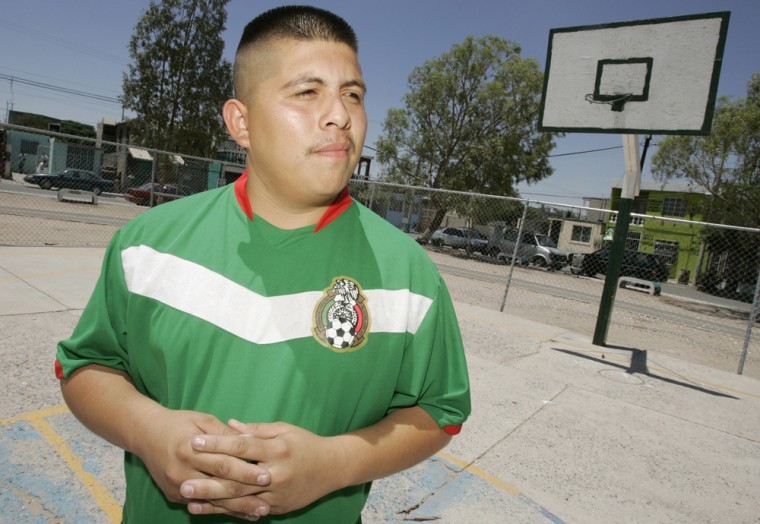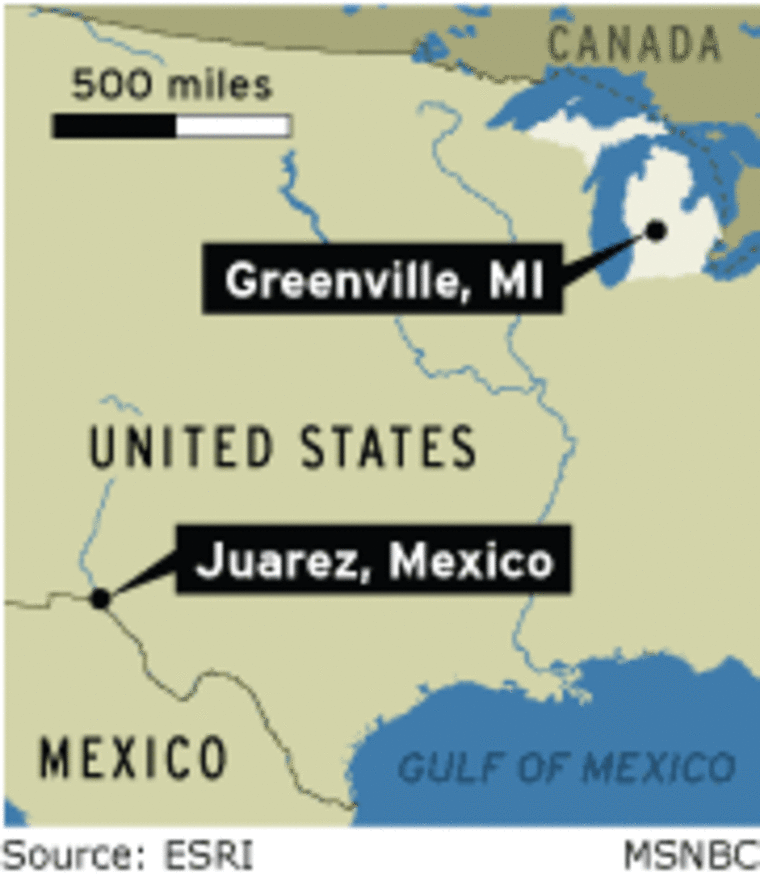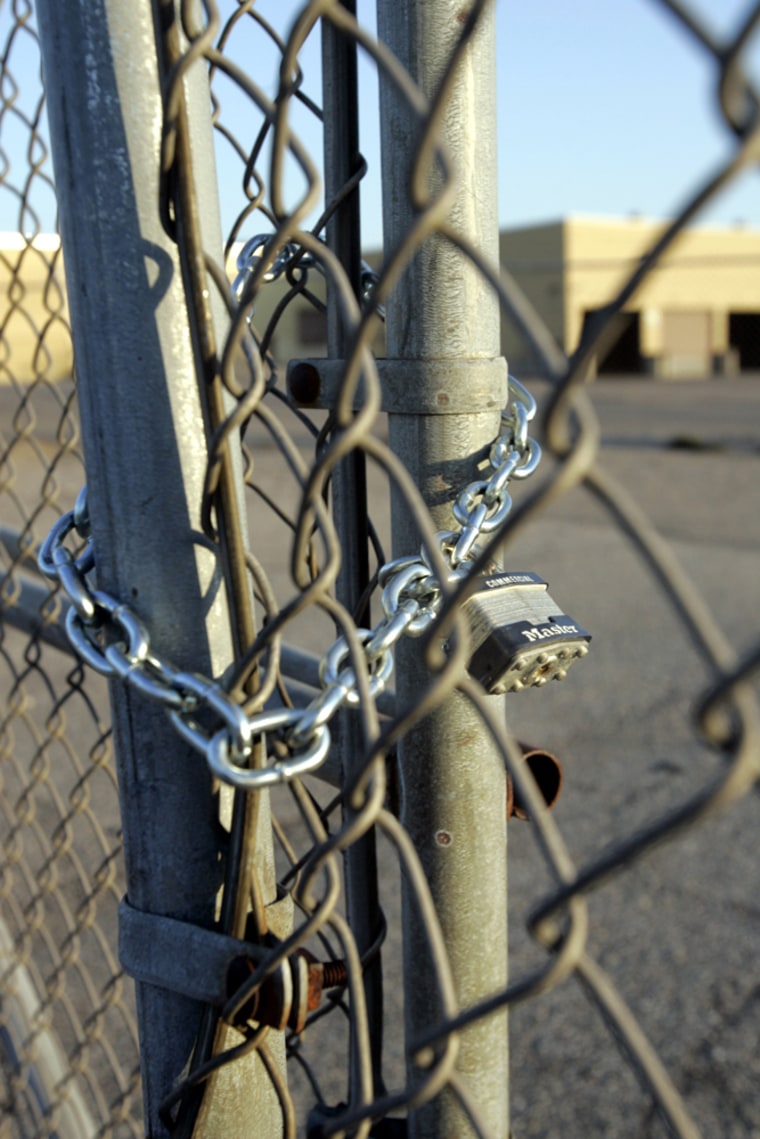Just a year ago, this was wild, open desert, home to nothing more than scattered shrubs and the occasional funnel clouds that kick up blinding dust storms.
Now, a $100 million factory rises from deep black asphalt. A young tree is planted near the entrance, and Teresa Rios waits anxiously under a sliver of shade it casts.
Rios, 27, is late for a court hearing. She is in the middle of a custody dispute with her ex-husband; for now, she and her two children live in a shelter for battered women.
Still, there is hope. She is two weeks into a job that pays her about $10 a day. Like the tree against the sun, she is rail thin, her life a modest but full effort. And she sees the Electrolux refrigerator factory as a path to a far better future.
"My dream is to be a top executive," said Rios, who did not earn a high school diploma. "I don't know if I'll make it, but this is one of my dreams. Really just to be free."
Crucible of capitalism in Chihuahuan desert
The Electrolux plant has done many things: It has sucked jobs from Greenville, Mich., where Electrolux closed a plant before moving here. It — and others like it — have transformed Juarez and the Chihuahuan desert into a bustling crucible of capitalism.
But more than anything else, the Planta Electrolux has transformed the lives of people like Teresa Rios and Andres Lozano.
Lozano, 27, was hired in December at Electrolux, employee No. 2319. Already the plant employs slightly more than the Greenville operation and promises to be twice as large. Based on an exchange rate of about 11.5 pesos to the dollar, workers in Juarez make in a day what workers in Greenville made in an hour or less. For corporate numbers crunchers, the math was easy.
Lozano supports his wife Alma, who does not work outside the home, and two young children, Iban, 4, and Evelyn, 6 months. His pay, which has risen quickly to 100 pesos a day, is enough to support the entire family. In another month he will earn 130 pesos a day.
In his old job, as a meat wholesaler, he made about the same amount of money but worked twice as much, usually 12 hours a day, 7 days a week. He sold and delivered processed meats, ham, bologna, franks, mostly to large grocery chains, working on commission.

Because he works less now, he has fewer problems at home. He has time to shop, see friends, see movies, go to flea markets, repair things around the house. He is a man more at ease, his posture relaxed, with a smile that comes more easily. With his salary, and with help from a government loan program, he was able to purchase a two-bedroom home for about $20,000.
"My kids will have what I didn't have," he said. "They'll have more of everything. They'll go out more. They'll have more things.
"I had the chance to go to college, but I had to work. I want my kids to go to college. I don't want them to be operators."
Maquiladoras, are a magnet for workers
Electrolux and the other factories, known as maquiladoras, are a magnet for workers. Since 1990 the population of Juarez has grown from about 800,000, to 1.3 million, and about a third of its residents came from outside its state of Chihuahua.
With a growth rate that is almost three times the Mexican average, Juarez is now Mexico's fourth largest city, growing much faster than the American city across the bridge, El Paso.
And there is no reason to believe the growth will end soon. Juarez is bound to the north and east by the U.S. border, and bound to the west by mountains. But the south, where Electrolux lies, presents no barriers, and land there is plentiful. It is expected that Electrolux's many suppliers of foam, plastic, electrical parts, will build their own plants nearby.
Once, Juarez was a small farming town; the growth of industry began in the 1960s, and increased steadily until the turn of the century, when competition from China cost the city tens of thousands of jobs.
Items like clothing and luggage are made more cheaply in China. But certain goods, refrigerators among them, benefit from being manufactured across the border.
A landmark victory for Juarez
The construction of the Electrolux plant (the company is building a second factory nearby to assemble washers and dryers) was a landmark, economic victory for Juarez, the return of good times and plentiful jobs. The near-term forecast is a shortage of workers, not jobs.
Angelica Espinoza was one of about 100 people hired by Electrolux in June. She is 33, a single mother of two teenage boys, her hair already graying at the edges. Hers was a difficult and lean childhood spent caring for her frail grandmother and doing chores for neighbors for coins to buy milk.

Her job at Electrolux is to wipe clean finished refrigerators coming off the line. By the end of the summer, she expected to make about 100 pesos a day.
As it is, when she gets home from work at 4 p.m., she cooks dinner, takes a 30-minute nap and cleans the house. Her washing machine has been broken for a few months, so every day she does a little laundry by hand in the back of the house, in an outdoor, concrete sink with a built-in washboard. It is a small, dirt backyard, strewn with bicycle parts.
Extras come hard. Unable to afford a dress for her son's graduation party, she didn't go.
'A very hard life'
"I had a very hard life," she said. "I hope God helps me to have a better life."
Like most who took jobs there, she has the equivalent of a middle-school education. And like the others, she said she was drawn to the better-than-average pay and the possibility of quick advancement. By the end of the year, Electrolux will hire almost 1,000 more people, giving employees like Espinoza quick seniority.
With earnings from his new job working in the repair department at Electrolux, Leonel Soto, 26, bought a new refrigerator, and a used, big-screen television, christened during a family viewing of Mexico's World Cup match against Angola.
He and his wife Yasmin's home has just one bedroom, which the couple shares with their two young children. A bed in the living room doubles as a sofa and guest bed and takes up nearly the entire room which Leonel painted light pink. The floor is still bare concrete, but he'd like to tile it soon. Within five years, he hopes to have a second floor added to their townhouse in the newest neighborhood in Juarez. Soto is ambitious and always volunteers to work overtime.
"I want to give my kids the best and I think I'll get it here," he said.
The boulevards that these workers traverse on their way to work — the Paseo de la Victoria, the Avenue de Las Torres — are lined with the signs of development and commerce and chaos.
Once planted fields of cotton and tomatoes are now Los Angeles-styled blocks of giant supermarkets and shopping malls. The Missiones mall houses a multiplex equipped with a VIP room where customers can order sushi while watching the latest, subtitled Hollywood blockbuster.
American brands abound in Juarez
On one side of the boulevard is a gated neighborhood of domed, stucco homes painted soft desert hues of saffron and tan. On the other side is a graffiti-covered, cinderblock slum of two-room shacks.
American brands like Home Depot, Wal-Mart, Wendy's, Costco and KFC are so generously represented that stretches of Juarez look more like America than Mexico. One of the city's oldest landmarks is the Plaza de Toros, an old arena that still hosts bull fights as well as concerts and wedding banquets. It will soon be torn down to make way for a new Wal-Mart.
Gloria Lopez, 55, came of age during the ascension of the maquiladoras. A teacher, she taught English in the factories. Her husband, an engineer, also worked in the maquila all his life.
"We have more money and there is more what you'd call progress, and I'm not against it," Lopez said. "It's good for all the people who come for the jobs."
But she can't help but long for the Juarez of her childhood, a place of smaller streets, shorter walks. Chinese immigrants grew fruits and vegetables and cotton on rented land. Juarez was a city of trees back then.
As the city grew, wealth and literacy grew, as well; Juarez now has one of Mexico's best colleges.
With growth comes problems: Drugs and murder
At the same time, Juarez also grew as a center for the trade of illegal drugs. Drug-related shootings are common. And it became famous for the unsolved murders of hundreds of women, factory workers, their bodies left by roadsides.
In her circle of friends, she said, only one or two out of every 10 people are from Juarez and she wonders if they can care about the city the way she does.
Andres Lozano wonders, too.
His father used to pull leaves off the eucalyptus tree in the park, the same one young Andres loved to climb, and make them into a tea as a cough remedy. It always seemed to work.
The tree is still there, although Lozano hardly recognizes it. The rims on the basketball court are bent. The grounds are marked by litter and graffiti.
"Kids don't care about the park anymore," Lozano said. "Parents have to teach their kids, 'This is yours; don't destroy it.' "
Maybe, Lozano suggests, it's because "a lot of people are not from here and this is not their city anymore. They just come here to see what they can get, they don't care. I'd like to go back to my old times. I've thought about trying to move to El Paso. But I prefer to visit. Juarez is my city."
